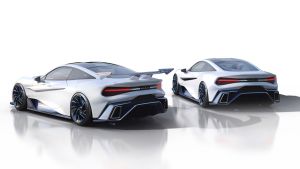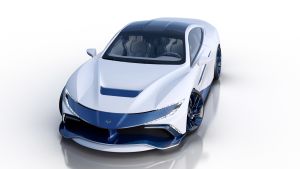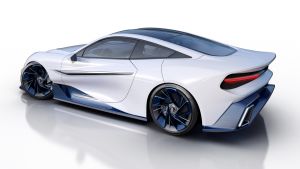A
Auto Express
Guest
Naran Automotive has revealed one of the options buyers will be able to spec on it’s upcoming 1,034bhp front-engined hypercar. It’s called the Celare Pack (from the Latin for “to conceal or hide”) – and it’s a detachable aero setup, which allows the car to generate more downforce than a GT3 racer.
Naran Automotive says its new aero package can be installed or removed “within 20 minutes” by its engineers, allowing the hypercar to be quickly set up for either track or road use. The firm will also supply the kit with a carbon fibre cradle, which holds the rear wing and canards when they’re not in use.
The cars in these latest images are still renders but Naran has confirmed that we’ll see the finished car by May this year, with an initial production run of 49 examples scheduled. Once the first cars are built, they’ll offer fresh competition for the likes of the McLaren Speedtail and Aston Martin Vulcan.
However, the company has already made plans for a further run of 59 cars that will be totally unique to their buyers, along with a V12-engined model and an off-road focused ‘Safari’ variant – all of which will be released within the next four years.
Naran Automotive has given a rough starting price of £900,000 for the basic car, but this price can easily inflate past £1.6 million with the extensive customisation options the company has planned.

The project was funded by the Indian-Zimbabwean businessman Ameerh Naran. He’s supported by former Jaguar Land Rover engineer Steve Pegg, as well as automotive designer Jowyn Wong – who is best known for his work on the Apollo IE.
Unlike most hypercars, the Naran’s engine is mounted up front rather than over the rear axle. However, it’s a front-mid setup, meaning the engine sits behind the front axle rather than directly above it, which should improve the car’s weight distribution.
It’s a difficult setup for a fledgling company to get right, though. So, to make the final car as reliable as possible (and to help keep development costs to a minimum), Naran Automotive drafted BMW for the project, repurposing and re-engineering some of the German firm’s engine, chassis and electrical architecture.
The Naran’s crash structure is shared with the BMW M8, although the front chassis and subframe were specially developed for the project to allow the engine to be mounted in a front-mid configuration. Naran Automotive has also borrowed BMW’s can-bus network, but the finished car will feature a unique infotainment setup.
Other than the unusual location of the engine, the Naran’s design follows the traditional hypercar rulebook, sporting a low nose, flared haunches and an enormous rear wing. The company also says that much of the car’s body is made from a blend of carbon fibre and natural flax – which help to keep its kerb-weight below 1,500kg.

When asked if there was any chance of Naran Automotive following Ferrari and Lamborghini into the SUV market, Ameerh Naran said: “None. We’re doing an off-road version of the same size, though. Think 911 Safari – that’s our idea of an SUV. If we do off-road cars, it’ll be just an off-road version of a high performance car.”
Ameerh kept most of the project’s specifics secretive for the time being but, from what we understand, the upcoming Naran “Safari” will share the same body as the road-going variant, but feature a jacked-up suspension system, some bigger wheel arches and a tweaked version of the standard car’s four-wheel-drive system.
However, it’s customisation where the Naran really gets into its stride. The company’s options list for the current car is exhaustive, stretching to bespoke paint finishes, a choice of exterior trim and a broad range of upholstery finishes for the cabin.
If they’ve got the money, buyers can even have personalised engravings on the underside of the engine’s pistons – and Naran Automotive will allow its customers to give their cars their own unique model name, drawing on a convention normally reserved for luxury yachts.
Like its crash structure, the Naran’s engines were poached from BMW’s parts bin – although they’ve been heavily breathed upon by the German tuning firm. Racing Dynamics.
The “entry-level” car’s 1,034bhp twin-turbocharged 5.0-litre V8 engine started out in life as the same 616bhp 4.4-litre unit used in the BMW M8. To add more than 400bhp to the engine’s output, Racing Dynamics stripped the block back to its bare bones, increased its capacity and filled it with strengthened forged components.

As well as that heady power figure, the 5.0-litre V8 chucks out an impressive 1,036Nm of torque – and, despite the drastic increase in performance over the standard BMW lump, Ameerh Naran remains confident that Racing Dynamics can provide the same level of reliability as a conventional OEM.
Naran Automotive claims the powertrain will deliver a 0–60mph time of “less than 2.3 seconds,” a 0–100mph time of 4.56 seconds and a top speed of more than 230mph.
Like the M8, the Naran’s engine is hitched to an adaptive all-wheel drive system, which sends power to all four wheels under standard running conditions. However, the Naran also comes with a setting which can send 100 per cent of the engine’s power to the rear wheels, for what the company calls a “more challenging driving experience.”
The Naran’s V8 engine will be followed by a V12 unit in the near future, which the company has also borrowed from BMW. It’ll be a heavily uprated version of the 6.75-litre engine used by Rolls-Royce – and, while the company is yet to release any official specifications, Ameerh promises the tune will be “very near to the engine’s limit.”
To cope with the engine’s power, the Naran’s chassis features plenty of motorsport-derived hardware, such as lightweight 22-inch hybrid-carbon wheels, double wishbone suspension, adjustable Ohlins dampers and enormous carbon ceramic brakes. There’s even manual adjustment for the car’s anti-roll bars and camber arms.
What do you make of Naran Automotive’s new hypercar? Let us know in the comments section below…
Continue reading...
Naran Automotive says its new aero package can be installed or removed “within 20 minutes” by its engineers, allowing the hypercar to be quickly set up for either track or road use. The firm will also supply the kit with a carbon fibre cradle, which holds the rear wing and canards when they’re not in use.
- SEE MORE Best hypercars 2021
The cars in these latest images are still renders but Naran has confirmed that we’ll see the finished car by May this year, with an initial production run of 49 examples scheduled. Once the first cars are built, they’ll offer fresh competition for the likes of the McLaren Speedtail and Aston Martin Vulcan.
However, the company has already made plans for a further run of 59 cars that will be totally unique to their buyers, along with a V12-engined model and an off-road focused ‘Safari’ variant – all of which will be released within the next four years.
Naran Automotive has given a rough starting price of £900,000 for the basic car, but this price can easily inflate past £1.6 million with the extensive customisation options the company has planned.

The project was funded by the Indian-Zimbabwean businessman Ameerh Naran. He’s supported by former Jaguar Land Rover engineer Steve Pegg, as well as automotive designer Jowyn Wong – who is best known for his work on the Apollo IE.
Naran hypercar: design and chassis
Unlike most hypercars, the Naran’s engine is mounted up front rather than over the rear axle. However, it’s a front-mid setup, meaning the engine sits behind the front axle rather than directly above it, which should improve the car’s weight distribution.
It’s a difficult setup for a fledgling company to get right, though. So, to make the final car as reliable as possible (and to help keep development costs to a minimum), Naran Automotive drafted BMW for the project, repurposing and re-engineering some of the German firm’s engine, chassis and electrical architecture.
The Naran’s crash structure is shared with the BMW M8, although the front chassis and subframe were specially developed for the project to allow the engine to be mounted in a front-mid configuration. Naran Automotive has also borrowed BMW’s can-bus network, but the finished car will feature a unique infotainment setup.
Other than the unusual location of the engine, the Naran’s design follows the traditional hypercar rulebook, sporting a low nose, flared haunches and an enormous rear wing. The company also says that much of the car’s body is made from a blend of carbon fibre and natural flax – which help to keep its kerb-weight below 1,500kg.

When asked if there was any chance of Naran Automotive following Ferrari and Lamborghini into the SUV market, Ameerh Naran said: “None. We’re doing an off-road version of the same size, though. Think 911 Safari – that’s our idea of an SUV. If we do off-road cars, it’ll be just an off-road version of a high performance car.”
Ameerh kept most of the project’s specifics secretive for the time being but, from what we understand, the upcoming Naran “Safari” will share the same body as the road-going variant, but feature a jacked-up suspension system, some bigger wheel arches and a tweaked version of the standard car’s four-wheel-drive system.
However, it’s customisation where the Naran really gets into its stride. The company’s options list for the current car is exhaustive, stretching to bespoke paint finishes, a choice of exterior trim and a broad range of upholstery finishes for the cabin.
If they’ve got the money, buyers can even have personalised engravings on the underside of the engine’s pistons – and Naran Automotive will allow its customers to give their cars their own unique model name, drawing on a convention normally reserved for luxury yachts.
Naran hypercar: engines and drivetrains
Like its crash structure, the Naran’s engines were poached from BMW’s parts bin – although they’ve been heavily breathed upon by the German tuning firm. Racing Dynamics.
The “entry-level” car’s 1,034bhp twin-turbocharged 5.0-litre V8 engine started out in life as the same 616bhp 4.4-litre unit used in the BMW M8. To add more than 400bhp to the engine’s output, Racing Dynamics stripped the block back to its bare bones, increased its capacity and filled it with strengthened forged components.

As well as that heady power figure, the 5.0-litre V8 chucks out an impressive 1,036Nm of torque – and, despite the drastic increase in performance over the standard BMW lump, Ameerh Naran remains confident that Racing Dynamics can provide the same level of reliability as a conventional OEM.
Naran Automotive claims the powertrain will deliver a 0–60mph time of “less than 2.3 seconds,” a 0–100mph time of 4.56 seconds and a top speed of more than 230mph.
Like the M8, the Naran’s engine is hitched to an adaptive all-wheel drive system, which sends power to all four wheels under standard running conditions. However, the Naran also comes with a setting which can send 100 per cent of the engine’s power to the rear wheels, for what the company calls a “more challenging driving experience.”
The Naran’s V8 engine will be followed by a V12 unit in the near future, which the company has also borrowed from BMW. It’ll be a heavily uprated version of the 6.75-litre engine used by Rolls-Royce – and, while the company is yet to release any official specifications, Ameerh promises the tune will be “very near to the engine’s limit.”
To cope with the engine’s power, the Naran’s chassis features plenty of motorsport-derived hardware, such as lightweight 22-inch hybrid-carbon wheels, double wishbone suspension, adjustable Ohlins dampers and enormous carbon ceramic brakes. There’s even manual adjustment for the car’s anti-roll bars and camber arms.
What do you make of Naran Automotive’s new hypercar? Let us know in the comments section below…
Continue reading...
